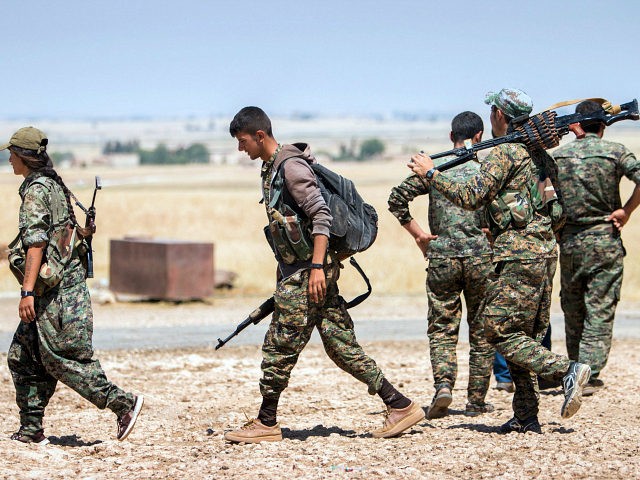A Pentagon spokesman has confirmed that the United States is seeking to begin the operation to liberate Raqqa, Syria, of the Islamic State terrorist group as soon as a parallel operation in Mosul, Iraq, is complete.
Raqqa is the self-proclaimed “capital” of the Islamic State, while Mosul operates as a regional capital in Iraq and remains the terrorist group’s biggest prize.
“We all feel it’s important to maintain pressure on ISIL at this particular moment in time, while they’re feeling the heat in Mosul,” Pentagon spokesman Peter Cook said on Monday. He confirmed that the military operation in Raqqa is scheduled to begin “within a matter of weeks.”
Cook’s remarks echo those of Pentagon chief Secretary Ashton Carter, who said in late October that the United States would like “to see isolation operations begin, oriented at Raqqa as soon as possible.” Carter added that he expected the operations to occur somewhat simultaneously, with the Raqqa operation underway towards the completion of the Mosul liberation operation.
The operation to liberate Mosul is currently two weeks old, with Iraqi troops confirming their presence within Mosul’s city limits on Monday. The Iraqi military is leading a coalition of Kurdish Peshmerga soldiers, Shiite Popular Mobilization Forces (PMF) militias, and U.S. special forces and air support in eradicating the Islamic State from the region entirely. Only Baghdad’s forces have permission to enter city limits, while the regional militias will work to secure the city’s suburbs, preventing ISIS terrorists from ensconcing themselves in a ring outside of the city.
The Raqqa operation promises to be significantly more complex due to the nature of the militaries looking to play a role. Raqqa, as the Stratfor Intelligence Agency notes, is a predominantly Sunni Arab city, but Syria’s Sunni militias are ill-prepared for such a large-scale military attack. The most competent militia on the ground in Syria is the People’s Protection Units (YPG), a U.S.-allied Kurdish force. Experts worry that Sunni civilians in Raqqa may not favorably greet a Kurdish ground force. Additionally, unlike the Iraqi Peshmerga, the government of Turkey objects to YPG participation in Raqqa, deeming the YPG a wing of the Kurdistan Workers’ Party (PKK), a U.S.-designated terrorist group.
Turkey insists on playing a role in the liberation of Raqqa. “Obama particularly wants to do something together [with us] about Raqqa,” Turkish President Recep Tayyip Erdogan said in September. “We have told him that this is not a problem for us… We said, ‘Let our soldiers come together, whatever is necessary will be done.’”
A month later, Erdogan insisted again on a role in Raqqa, calling for “a 5,000-square-kilometer terror-free zone” around the city and stating that Turkey has “no tolerance” of the YPG’s presence in that region, once again referring to the militia as terrorists.
“The Raqqa operation must be launched by legitimate armies,” Turkish Deputy Prime Minister Numan Kurtulmuş told the pro-Erdogan Daily Sabah newspaper on Wednesday.
“Turkey’s idea on a Raqqa operation is clear. We are for [an operation] in Raqqa to be made consisting of the people of Raqqa. It is our opinion that it will be the correct thing to conduct [the Raqqa operation] – both militarily and strategically – after the Mosul and Euphrates Shield operations end,” Kurtulmuş said on Monday. Turkey has begun training its own Arab fighters in the region, Stratfor notes, and they appear unwilling to cooperate with the YPG.
“Syria’s Turkish-backed rebels are already clashing with Kurdish YPG units in northern Aleppo; further conflict, or perhaps a rebel push toward Manbij, could easily distract the Kurds from the Raqqa operation down the road,” Stratfor reports.
As Raqqa is not traditionally part of Kurdish Syria, or Rojava, it also holds little strategic value in the eyes of the YPG.

COMMENTS
Please let us know if you're having issues with commenting.